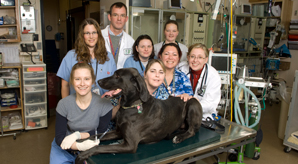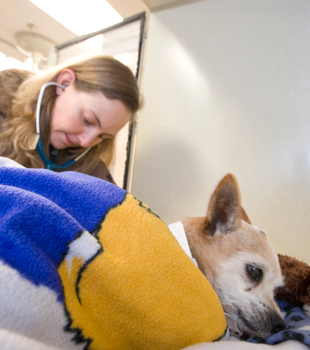Emergency/Urgent/Critical Care
What to Expect at Your Visit
Our goal is to offer you comprehensive veterinary medical care while providing instruction for the next generation of veterinarian professionals, including our students, interns, residents, and veterinary technicians.
Most owners and their pets can expect the following when visiting our Emergency Care, Urgent Care, or Critical Care Unit:
Emergency Care
- Make yourself known to the front desk immediately upon arrival.
- All emergency cases will be assessed and treated as quickly as possible, usually by our board-certified emergency and critical care specialists.
- With your permission, we will transport your pet to our emergency area where we can most effectively evaluate and begin emergency treatment. In the best interest of your pet, we ask you to remain in the lobby area during this time.
- A fourth-year veterinary student or a nurse will seek pertinent information from you as soon as possible and report back to the emergency team.
- The veterinarian and student will be with you once they have completed their initial assessment to discuss their findings and treatment options with you.
- We will reunite you with your pet as soon as possible.
- If your pet needs an extended stay to treat their emergent issue, they will be monitored by our Critical Care Unit, and you may visit your pet according to the Critical Care Visit Guidelines.
- Emergency cases can be especially stressful on pet owners. We invite you to speak with our in-house counseling staff at the Argus Institute, who can talk with you through some of the stress and difficult choices that often occur with emergency care.
- Please feel free to ask any questions at any time.
Urgent Care
- Please bring your pet to the hospital on a leash or in a carrier, for everyone's safety. If you need assistance getting your pet out of your vehicle, please inform the front desk.
- If you are being referred to us, please bring any previous records, X-rays, etc., from your veterinarian.
- Check in at the front desk through the main entrance.
- A fourth-year veterinary student and staff nurse will make initial contact to assess your pet's condition, perform an initial exam, and discuss your pet's medical history. Questions they will ask include:
- What brings you here today?
- Have you given your pet anything for its current problem?
- What medications is your pet currently on?
- What medical conditions or surgeries has your pet had in the past?
- Are you aware of any allergies your pet has?
- What is your goal for today's visit?
- If your pet is in critical condition it will be taken to Emergency Care for immediate care and stabilization.
- Veterinarians, veterinary nurses, and students will confer about the best treatment for your pet and present you the options and related cost estimates.
- Your pet's care will proceed according to the decisions made with you.
- Remember, we strive to get you and your pet's needs met as efficiently as possible!
Critical Care Unit
We recognize the importance of daily visits for both the patient and the family members. We welcome you to visit your pet, but please keep in mind the following Critical Care Unit visit policies:
We provide comfortable, clean bedding and are meticulous about keeping your pet clean and comfortable. Please help us to be able to spend more quality time caring for your pet by not leaving bedding or other items for your pet.
- Our visiting hours are from 10 a.m.-9 p.m. Monday through Friday and by special arrangement on weekends and holidays.
- For biosecurity reasons we strongly recommend that children under 10 not enter the Critical Care Unit. This is for their protection.
- To arrange your visits, communicate with your pet's primary VTH veterinarian. Ask the front desk for the name of the veterinarian or the fourth-year veterinary student assigned to your pet's care if you are unsure.
- The veterinarian or senior student managing your case will accompany you on your visit with your pet.
- Your pet may be taken to an exam room for a quiet, private visit if your pet can tolerate being moved.
- Due to the busy nature of the Critical Care Unit, visits will be limited to 10 minutes.
- If conditions in the Critical Care Unit change (an emergency arrives or a critical case requires immediate attention), you may be asked to leave the unit. If this occurs, we are happy to reschedule your visit with your pet so you can both have that much-needed time together.
All communication and status reports will given to you by your primary VTH veterinarian or the fourth-year veterinary student managing your case. Be aware that you will not receive this information from the personnel operating the Critical Care Unit.
Note: The Colorado State University Veterinary Teaching Hospital retains the right to alter this policy, without written notice, to ensure the safety of personnel, clients, and patients.


